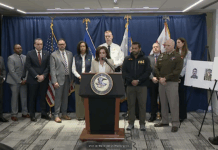
(Georgia Recorder) — A disastrous presidential debate performance at CNN’s studios in Atlanta, a historically deadly hurricane, a school shooting where a parent was charged and an accusation that brought Georgia’s election interference case to a halt – these were just some of the big moments from 2024.
Here’s a look at the biggest stories this year in Georgia politics.
Election interference case is derailed
In January, an attorney for one of the lesser-known co-defendants in the Fulton County election interference probe filed a motion that would upend District Attorney Fani Willis’ plans to take the case to trial in 2024 – or ever.
The filing accused Willis of having a romantic relationship with the special prosecutor, Nathan Wade, in the probe and argued that the arrangement represented a conflict of interest, pointing to vacations the two took together. Willis admitted to the relationship but says it started after Wade was hired.

A Fulton County judge ruled in March that Willis could stay on the case if Wade resigned, which he promptly did. But a Georgia Court of Appeals panel issued a 2-1 ruling this month saying that wasn’t adequate and disqualified Willis and her office from the case. Willis is appealing the decision to the Georgia Supreme Court.
As the year winds down, the case is left limping along and risks losing its top target, President-elect Donald Trump, if his attorneys succeed in arguing that the incoming president cannot be prosecuted once he is sworn in next month.
Epic debate failure
Atlanta was the setting of the now infamous CNN debate that put President Joe Biden’s frailty on full, unfiltered display for the American public in late June. The debate exposed the president’s vulnerabilities, though he and his supporters dismissed it as a bad night, and led to intense scrutiny of Biden’s fitness and raised new questions about his ability to lead the country for another four years.

More than three weeks would pass before Biden dropped out of the race and endorsed Vice President Kamala Harris to run in his place, setting her up to run an abbreviated campaign that bypassed the usual primary process.
The unusual move created an unprecedented vacancy at the top of the ticket just one month before Biden was scheduled to officially accept his party’s nomination.
Side note: Biden ended his visit that day in a very Atlanta way with a late-night stop at a Waffle House, where he told reporters he thought he “did well” at the debate.
Battleground status endures
One of seven swing states, Georgia was a top target for both presidential candidates this year. Harris and Trump’s tit-for-tat campaign events – often falling within a week, if not days, of each other – gave voters plenty of opportunities to see the candidates in person this fall (and ran the state’s politics reporters ragged).
But unlike four years ago, when Biden narrowly won Georgia by about 12,000 votes and became the first Democratic presidential candidate in three decades to clinch the state, Trump found electoral redemption here with a healthy 115,000-vote edge over Harris in November’s election.
Also, unlike four years ago, Trump has accepted the outcome of Georgia’s election this time.
School shooting leads to arrest of father

A 14-year-old student shot four people at Apalachee High School in Barrow County in September, killing two students and two teachers. Nine other people were injured.
The shooter was arrested and charged with murder. But in a rare move, his father, 54-year-old Colin Gray, was also charged with involuntary manslaughter, second-degree murder, and cruelty to children.
The father purchased the AR-style firearm used in the shooting last December as a Christmas gift for his son, according to law enforcement officials. In 2023, the police had talked to the son about online posts threatening to target a school in another county.
It was only the second time nationally that a parent of a school shooting suspect has been charged.
The shooting has also increased calls for gun safety measures.
A historically deadly storm
In late September, Hurricane Helene crossed over the Florida state line into Georgia still at hurricane strength and then barreled up the eastern side of the state, devastating communities along the way.
Helene will be remembered for the string of tragedies left in the storm’s wake. Thirty-four people were killed in Georgia alone, making it the deadliest storm to hit the state in more than a century.
The storm also caused at least $5.5 billion in agricultural and timber losses, putting Georgia leaders from both parties at the center of a late-year fight over disaster relief in Washington.
College student’s murder becomes flashpoint in national immigration debate
The impact of Laken Riley’s murder while jogging on the University of Georgia’s campus in February was immediate and widespread, fueling a national debate over immigration when it was revealed that her then-accused killer had entered the country illegally.

The 22-year-old Augusta University student’s name was evoked under the Gold Dome when state lawmakers pushed forward measures meant to force local enforcement to assist federal immigration officials, and her murder was often cited by President-elect Donald Trump on the campaign trail.
Jose Antonio Ibarra was convicted in November on three counts of felony murder and counts of malice murder, kidnapping with bodily injury and aggravated assault with intent to rape, and he was sentenced to life in prison without the possibility of parole. His attorneys have since asked for a new trial.
New reporting shows two Georgia women died trying to have an abortion in 2022
At least two Georgia women, Amber Nicole Thurman and Candi Miller, died after the state’s six-week abortion ban took effect in 2022 while trying to end their pregnancy, according to ProPublica.
The state’s maternal mortality review committee concluded that both deaths were preventable.

Miller’s death in particular became part of the national debate over the impact of the wave of abortion restrictions that took effect after the U.S. Supreme Court ended the federal right to an abortion more than two years ago.
The 28-year-old mother attempted to terminate her pregnancy using abortion medication from a clinic in North Carolina. But when she experienced a rare complication and went to an Atlanta-area hospital for treatment, the doctors waited 20 hours to perform a dilation and curettage, or D&C, to treat sepsis that resulted from an incomplete abortion.
In Georgia, the revelations reignited debate over an exception in the law that purports to protect mothers when their own health is imperiled. There is expected to be a new push to repeal Georgia’s 2019 law, which is currently before the Georgia Supreme Court again.
In November, Georgia officials dismissed all members of the maternal mortality review committee in response to ProPublica obtaining internal reports detailing the deaths of the two women.
Trump-aligned trio on state election board goes rogue
Three members of the State Election Board attempted to push through new election rules that critics argued were attempts to create chaos in the immediate aftermath of the November election in Georgia.

Rules like requiring a hand count of all ballots on election night thrust the otherwise little-known panel into the national news. Their work also earned them a shoutout from Trump on the campaign trail, where he called them “pit bulls fighting for honesty, transparency and victory.”
Their actions drew pushback from the board’s GOP governor-appointed chairman, John Fervier, and Republican Attorney General Chris Carr, who warned the members that they were exceeding their authority. The board is designed to interpret and implement the policy decisions made by the Legislature.
After the election, the board voted instead to ask state lawmakers to take up legislation next year that would address their concerns, rather than pursue their own rulemaking.
Medicaid expansion gets a look
For the first time, high-ranking Georgia Republicans went into a new legislative session saying they were open to considering expanding the public insurance program for the poor, or at least a version of it.
Georgia’s GOP leaders had long shunned expanding Medicaid under the Affordable Care Act, so it was big news this year when an expansion proposal received a surprise hearing in a Senate committee.

But Gov. Brian Kemp’s limited expansion program, Georgia Pathways to Coverage, cast a long shadow over those discussions, and the governor’s continued opposition to full expansion has been credited with blocking this year’s talks from progressing.
At the time, Republican lawmakers said the governor’s program deserved more time to be successful. As of November, 5,562 people enrolled in the program, according to a tracker from the Georgia Budget and Policy Institute.
Georgia is one of 10 states that have not fully expanded Medicaid under the Affordable Care Act.
School voucher bill passes
Following years of failed attempts, GOP lawmakers mustered enough votes this year to expand the state’s school voucher program, thanks partly to the governor’s announcement that getting it passed this year would be a priority for him.

The measure allows families with students enrolled in Georgia’s k-12 public schools to remove $6,500 of state funding provided to local school districts in order to attend private schools or to homeschool.
Critics of the vouchers argued the measure will siphon away funding from public schools and questioned whether the $6,500 would even be enough for cash-strapped families to afford the cost of tuition at many of the state’s better private schools.
But an expansive interpretation of the law by the new agency running the program has led to far more students being made eligible for the voucher than originally expected, the Associated Press reported in December.






